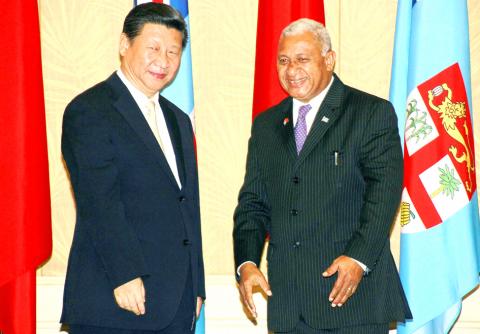Chinese President Xi Jinping (習近平) yesterday injected a further 70 million yuan (US$11.4 million) of aid money into Fiji as he wrapped up a round of talks in the Pacific nation aimed at strengthening ties in the region.
In a stopover following the G20 summit in Australia, Xi held talks with Fijian Prime Minister Voreqe Bainimarama and seven other island nation leaders who form the nucleus of a 12-nation Pacific voting bloc in the UN.
“I hope my visit can open a new chapter in bilateral friendly and cooperative relations,” Xi told the leaders of Samoa, Vanuatu, Niue, Tonga, the Federated States of Micronesia, the Cook Islands and Papua New Guinea.

Photo: AFP
The talks also involved signing memoranda of understanding on a range of issues, including climate change, with several island nations under threat from rising sea levels.
Fijian Permanent Secretary for Foreign Affairs and International Cooperation Amena Yauvoli confirmed the aid grant and told the Fiji Times that it was “an additional 70 million yuan to the 80 million yuan that was offered in August. So in total, this is about 50 million Fijian dollars [US$25.5 million] in grant and aid.”
Papua New Guinean Prime Minister Peter O’Neill said following his talks with Xi that it was important for the region to stay connected to the Asian powerhouse.
“China is a very important global player in terms of not only trade and investment, but in security and many other related issues and climate change,” O’Neill told reporters. “I think it is important that we engage meaningfully with China on many of those issues.”
Bainimarama said Fiji, which in 1975 became the first Pacific island nation to establish diplomatic ties with China, wanted Beijing to be fully engaged in the region.
Meanwhile, Indian Prime Minister Narendra Modi, who also visited Fiji after the G20 in an attempt to build ties with the region, blogged on his official Web site on Friday about the importance of the Pacific to India.
He added, about his address to the Fijian and Australian parliaments during his trip: “There is no bond that is stronger than a bond between two democracies.”

MAKING WAVES: China’s maritime militia could become a nontraditional threat in war, clogging up shipping lanes to prevent US or Japanese intervention, a report said About 1,900 Chinese ships flying flags of convenience and fishing vessels that participated in China’s military exercises around Taiwan last month and in January have been listed for monitoring, Coast Guard Administration (CGA) Deputy Director-General Hsieh Ching-chin (謝慶欽) said yesterday. Following amendments to the Commercial Port Act (商港法) and the Law of Ships (船舶法) last month, the CGA can designate possible berthing areas or deny ports of call for vessels suspected of loitering around areas where undersea cables can be accessed, Oceans Affairs Council Minister Kuan Bi-ling (管碧玲) said. The list of suspected ships, originally 300, had risen to about 1,900 as

DAREDEVIL: Honnold said it had always been a dream of his to climb Taipei 101, while a Netflix producer said the skyscraper was ‘a real icon of this country’ US climber Alex Honnold yesterday took on Taiwan’s tallest building, becoming the first person to scale Taipei 101 without a rope, harness or safety net. Hundreds of spectators gathered at the base of the 101-story skyscraper to watch Honnold, 40, embark on his daredevil feat, which was also broadcast live on Netflix. Dressed in a red T-shirt and yellow custom-made climbing shoes, Honnold swiftly moved up the southeast face of the glass and steel building. At one point, he stepped onto a platform midway up to wave down at fans and onlookers who were taking photos. People watching from inside

Japan’s strategic alliance with the US would collapse if Tokyo were to turn away from a conflict in Taiwan, Japanese Prime Minister Sanae Takaichi said yesterday, but distanced herself from previous comments that suggested a possible military response in such an event. Takaichi expressed her latest views on a nationally broadcast TV program late on Monday, where an opposition party leader criticized her for igniting tensions with China with the earlier remarks. Ties between Japan and China have sunk to the worst level in years after Takaichi said in November that a hypothetical Chinese attack on Taiwan could bring about a Japanese

The WHO ignored early COVID-19 warnings from Taiwan, US Deputy Secretary of Health and Human Services Jim O’Neill said on Friday, as part of justification for Washington withdrawing from the global health body. US Secretary of State Marco Rubio on Thursday said that the US was pulling out of the UN agency, as it failed to fulfill its responsibilities during the COVID-19 pandemic. The WHO “ignored early COVID warnings from Taiwan in 2019 by pretending Taiwan did not exist, O’Neill wrote on X on Friday, Taiwan time. “It ignored rigorous science and promoted lockdowns.” The US will “continue international coordination on infectious